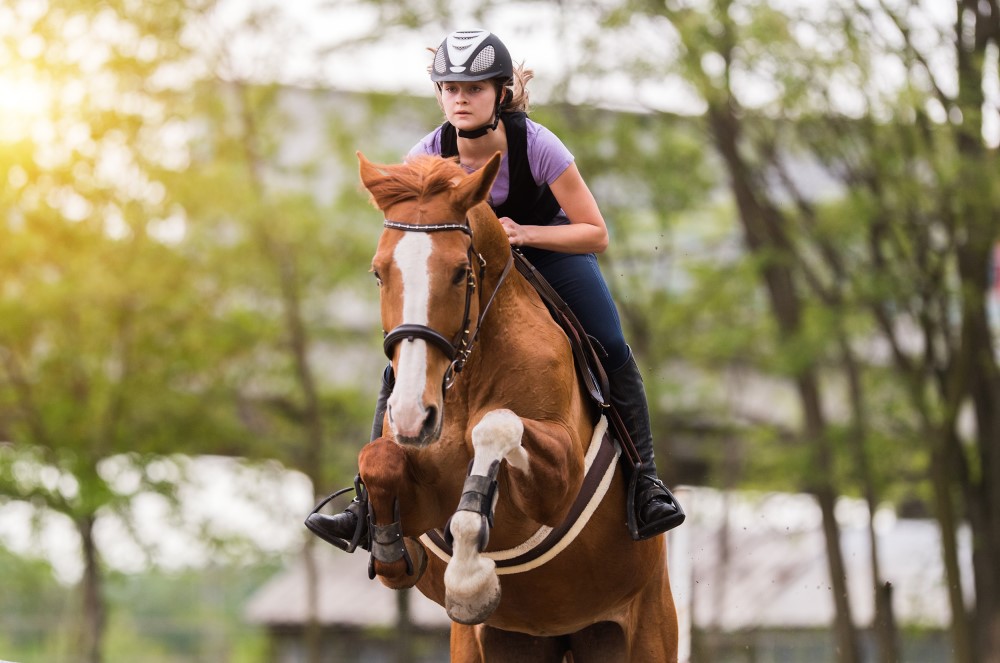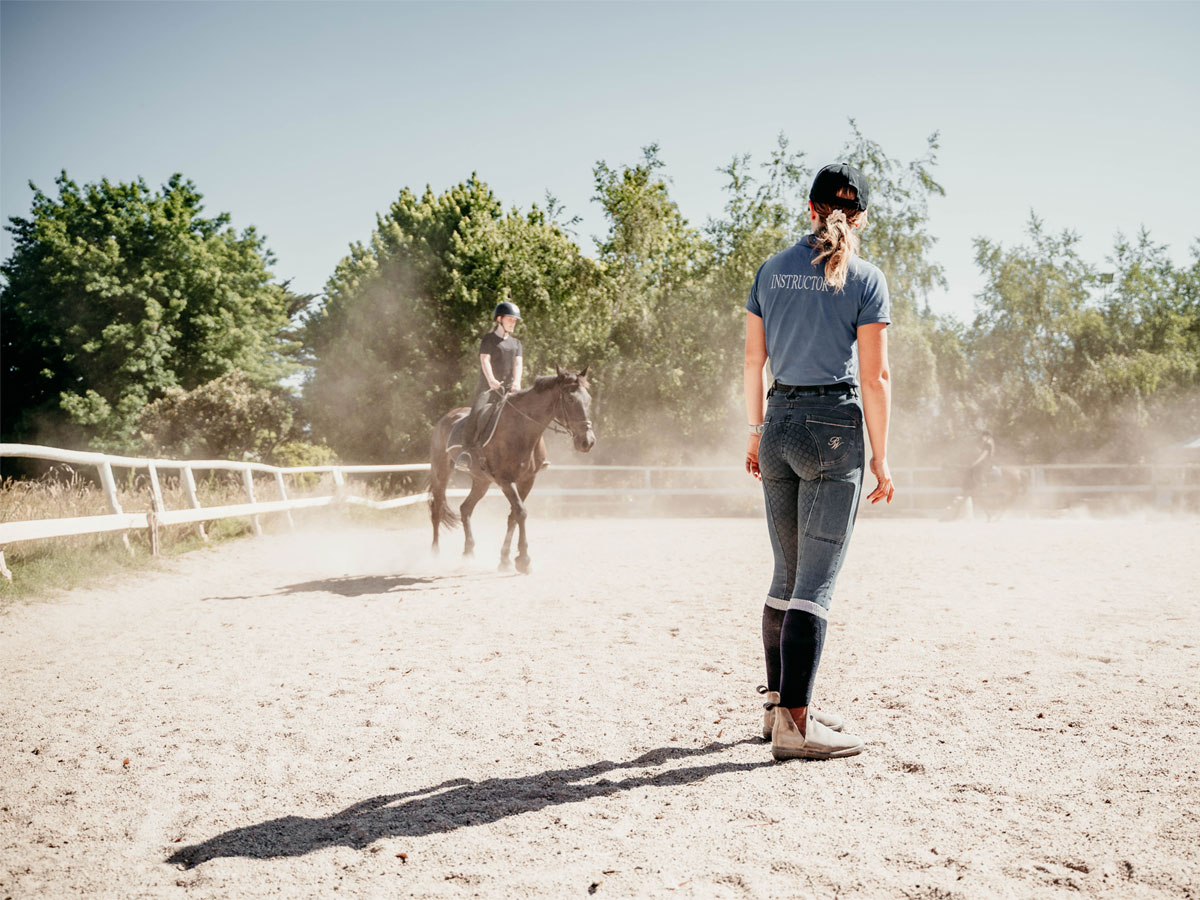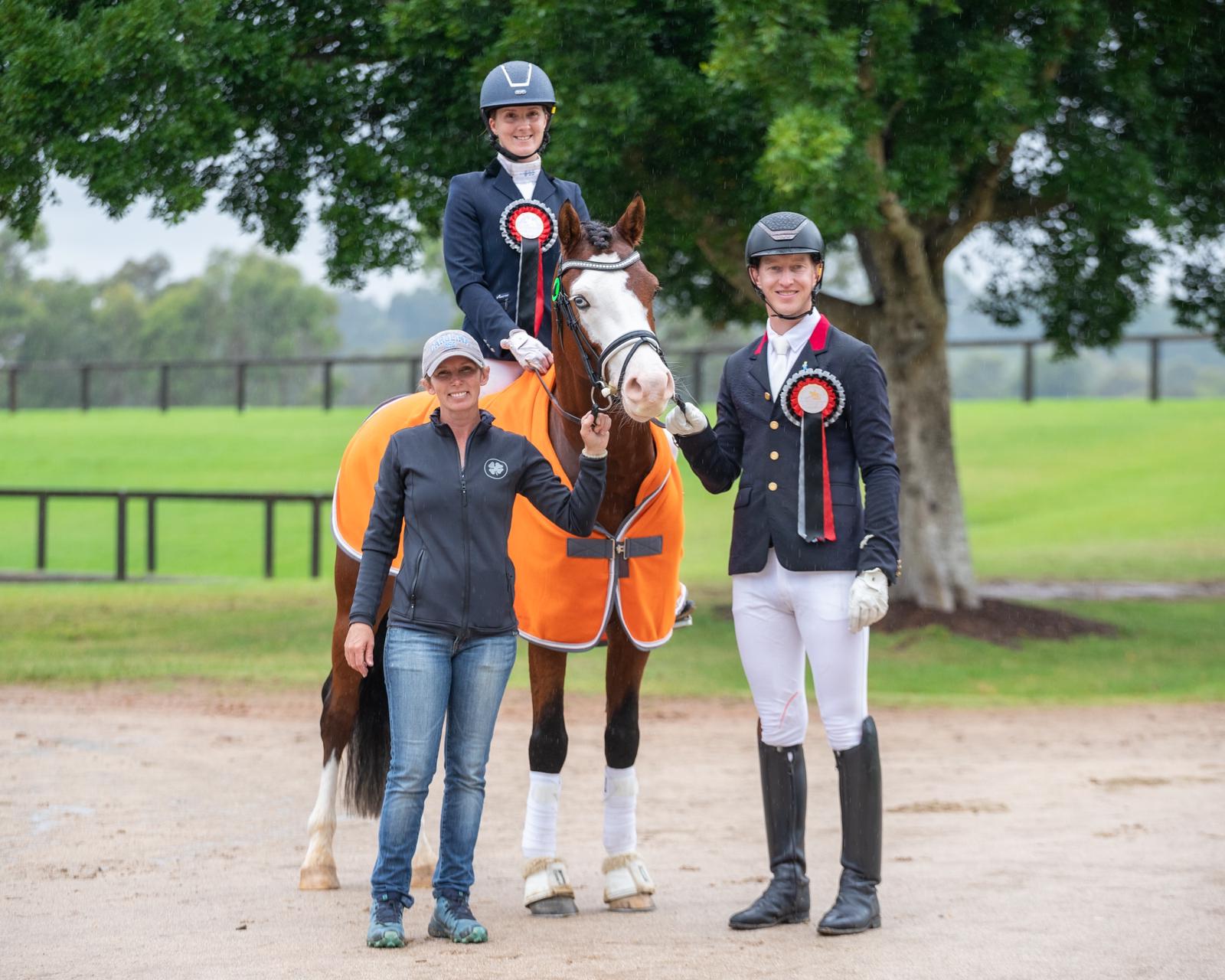We have all experienced those magic moments when we are “in the zone” when we are riding. We are completely focused on what we are doing, fully present. Time sort of disappears, the chatter in our head stops, particularly that voice that comments about ourselves, or worries about the process or the result.

Australian eventer Shane Rose and Dotti in the zone on cross country. Image by Libby Law Photography for the FEI.
Being “in the zone” gives us a sense that that our mind and body are as one working together automatically. Generally, we feel happy or better than happy, sometimes described as a deep sense of wellbeing when this happens.
The feeling is likely to be long-lasting and we will continue to feel good after we have achieved this flow state. We are likely to feel invigorated after achieving flow states. We are likely to produce our best performances in this state.
Once we have had this experience we are likely to want to find it again. Autotelic experiences are those that we find are worth doing just for their own sake, for the feeling it gives us. Riding is like that. It doesn’t always happen and can be elusive. Scientists have called this a “flow state” and have studied how we can best find these states. Quite a lot of the research has been done with elite athletes, but flow states can be achieved while people are producing art or music, gardening or playing chess.
Hungarian-American psychologist Mihaly Csikszentmihalyi was one of the prominent scientists in this field. He said “the best moments in our lives are not the passive, receptive, relaxing times. The best moments usually occur if a person’s body or mind are stretched to its limits in a voluntary effort to accomplish something difficult or worthwhile.”
“We are likely to produce
our best performances
in this state.”
EIGHT ESSENTIAL ELEMENTS
Eight components have been identified as the essential elements of flow states:
• Clear immediate goals, in the moment, every minute. If you are climbing a mountain, every step is a goal, e.g. maintaining an even rhythm throughout the work.
• You/they know every moment by moment how you/they are doing; feedback is immediate, the feedback is clear. This helps you stay focused. If you are training a horse to be quicker off your leg, the horse gives you feedback immediately.
• The challenges of the activity are matched with the person’s skills. It is not so enjoyable if the task is too hard or out of your ability, because you can’t succeed. But if it’s too easy it’s not interesting or enjoyable.
• When these three conditions are met, flow states are more possible. “Our attention is focused into a single concentrated beam”, as Csikszentmihalyi describes it.
• The normal concerns of everyday life drift away. The past and future are not a part of flow states. This can feel like an escape from daily stresses, being fully present in the moment.
• A sense of being in control emerges.
• A sense of losing the sense of identity. This can lead to transcendence, an exhilarating sense of being part of a bigger whole. For equestrians this is the centaur feeling, being one with the horse, not self and other.
• Time is transformed. Time can slow down while you notice everything in that moment, or time can pass without being noticed.
We are likely to find flow most easily when we are training at home in a familiar space, training something that we are already proficient in. When we can achieve flow at home then we are more likely to be able to achieve this peak performance at a competition. Of course, if we have a routine of preparation and warming up at home that we replicate at a competition, we are more likely to achieve flow. Try to build a routine at home that helps you focus before you even get on. Don’t multi-task.
FOCUS DURING YOUR WARM-UP
If you want to train in a way that is more likely to achieve flow states, I suggest that when you are at home, consciously focus on what you are doing. Have a structured warm-up every time and in the warm-up focus on your body. For example, I always start with walk on a long rein. I focus on feeling where my horse’s legs are, feeling for when he relaxes and his back stretches – which takes at least five minutes generally. While we are walking, I adjust my position. Stretch up from the waist up, down from the waist down, stretching the front of the thighs and the back of the calves, even weight in each seat bone. Carry my hands (short reins) and an even contact with the mouth when I do take up the contact.

Having a structured warm up can help you reach a flow state once you enter the competition arena. Image by Boots & Hooves Photography.
We repeat free walk, medium walk transitions a few times so he is clear that shortening the reins does not mean trot. Then we trot, getting him to stretch into the contact. Then we loosen up in leg-yield (which we might have done at walk). We leg-yield on the circle, which can have quite a lot of bending, and we leg-yield from the side to the centreline and stay on the same rein. This habitual warm-up helps me be tuned to my horse and my body, a bit like a grounding process on horseback.
If I warm up exactly the same way at a show, we are more likely to be attuned to each other. This prepares us both physically and mentally for the main part of the work where the degree of difficulty is higher and so we are more likely to find flow. When I am training the higher-level work that the horse is familiar with, we are more likely to achieve flow.
Any time a distracting thought comes into your mind, just bring your attention back to your horse and your body. You will need to do this kindly and patiently over and over again. At home the thought might be about what you have to do next, but at a show you might be thinking about what the people watching are thinking, which will stop you from entering a flow state. So, at home practise being in control of what you pay attention to and do not pay attention to random thoughts. Then at a competition you must do the same thing.
To achieve a flow state our minds must be fully occupied by what we are doing. The task must be complex enough to demand our attention but not so difficult that we need to be consciously thinking about it and analysing our performance. So it needs to be something that we care about and have significant skills with. When we are building our skills, practising, and learning we are unlikely to achieve flow states. The first time you compete in a competition you are unlikely to achieve flow. When you and your horse are comfortable at a level but still challenged, you are more likely to achieve flow.

Focusing on the journey rather than the destination can help you achieve a flow state. Image by Leanjo de Koster for the FEI.
FULLY PRESENT IN THE PRESENT
We should be focused on the journey, not the destination. If we are thinking about a destination, for example, making the time cross country or getting a clear round, we are not fully present in the present and we are not in flow. If we are trying to do something too hard, that we find stressful or frightening, we will not be in flow either.
We are more likely to find flow if we are not distracted. For example, if you are trying to build capacity to find a flow state you are best off riding alone, not being coached. Don’t have your ear pods in multi-tasking with listening to the latest podcast. Listening to music that helps you find the right level of arousal may be of benefit, but don’t listen to vocal music as the lyrics will not help you find flow. The part of the brain we use for verbal language is generally switched off in flow states, so you don’t want to pay attention to words.
We can build capacity to achieve flow by practising, but we probably can’t maintain it for longer than two hours. However, we don’t need to achieve flow for long periods of time when we ride.
Scientists don’t fully understand flow states, but some things are known. Not surprisingly, our dopamine networks are activated – the brain’s reward pathways. Of course, we know that this is also true of animals, that when they are performing something they have learned, their dopamine pathways are activated too. Dopamine makes us feel relaxed and energised and optimistic; our brain’s Default Mode Network (DMN) is activated.
Flow states make you happier, Csikszentmihalyi found in his seminal book, Flow: The Psychology of Optimal Experience (Harper, 1990). “If everything you do is for the simple act of being alive, you will never be bored or anxious. Flow is like a magnet for growth, it pulls us to higher and higher levels of being to increasingly complex experiences.”
He describes that it is possible to develop flow in all aspects of life, work, play, relationships. And that includes riding! Go with the flow! EQ
YOU MIGHT ALSO LIKE TO READ BY KERRY MACK:
How to Resolve Common Problems – Equestrian Life, June 2023
A Smarter Way to Compete – Equestrian Life, May 2023
What Motivates Me – Equestrian Life, March 2023
More Than a Walk in the Park – Equestrian Life, February 2023
Scott Keach Makes His Own Luck – Equestrian Life, December 2022
No Room for Bullying in Our Sport – Equestrian Life, November 2022
Avoid the Mud (Play Indoors) – Equestrian Life, October 2022
Why We Love Our Sport – Equestrian Life, September 2022
Getting on the Bit – Equestrian Life, July 2022
Positive Training Really Clicks with Horses – Equestrian Life, June 2022
Learn From Your Mistakes – Equestrian Life, March 2022 issue
Young Horse Classes: A Fun Launching Pad – Equestrian Life, February 2022
Making Sense of all the Bits & Pieces – Equestrian Life, January 2022
The Secret to ‘Soft Hands‘ – Equestrian Life, December 2021
Ask Less, Reward More – Equestrian Life, October 2021
So You Want To Go To The Games? – Equestrian Life, September 2021
The Ins & Outs Of Bitless Bridles – Equestrian Life, July 2021
Taking The Plunge With The Lunge – Equestrian Life, June 2021
Dressage for Showjumpers – Equestrian Life, May 2021
23 Shoulder-In Exercises to Improve Your Horse – Equestrian Life, April 2021
Understanding Your Horse’s Inner Thoughts – Equestrian Life, March 2021
Make the Most of Your Seniority – Equestrian Life, February 2021
Building Better Relationships – Equestrian Life, January 2021
Whipping Up Controversy – Equestrian Life, December 2020
The Importance of a Trusting Relationship – Equestrian Life, November 2020
Welcome to Kindergarten for Foals – Equestrian Life, October 2020
The Carrot or the Liquorice? Positive Reinforcement – Equestrian Life, September 2020
Submission or Stress? Something to Chew On – Equestrian Life, August 2020
A Relaxed Horse is a Happy Horse – Equestrian Life, July 2020
The Literate Horse Rider – Equestrian Life, June 2020
Why Horses Love Ingrid Klimke – Equestrian Life, May 2020




